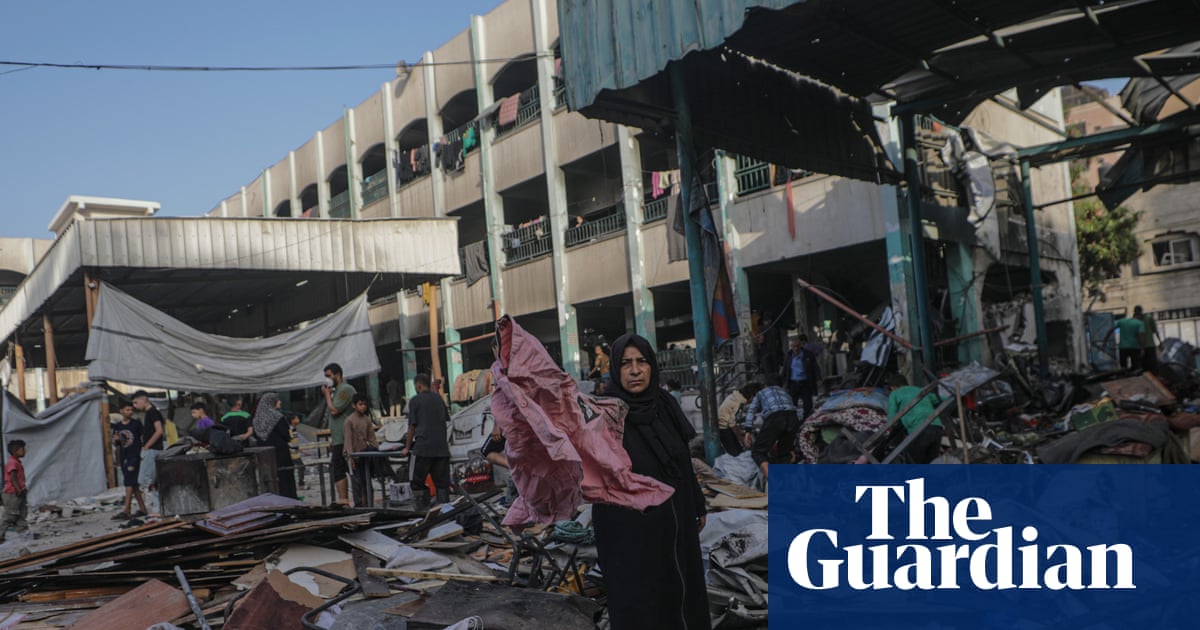The UK must impose sanctions on the Israeli government and its ministers and also consider suspending it from the UN to meet its “fundamental international legal obligations”, more than 800 lawyers, academics and retired senior judges, including former supreme court justices, have said.
Ina letter to the prime minister, they welcome Keir Starmer’s joint statement last week with the leaders of France and Canada warning thatthey were prepared to take “concrete actions”against Israel. But they urge him to act without delay as “urgent and decisive action is required to avert the destruction of the Palestinian people of Gaza”.
The signatories, including the former supreme court justices Lord Sumption and Lord Wilson, court of appeal judges and more than 70 KCs, say that war crimes, crimes against humanity and serious violations of international humanitarian law are being committed in Palestine.
There is mounting evidence of genocide, which is either being perpetrated or at a minimum at serious risk of occurring, the letter states, highlighting recent comments by the Israeli finance minister, Bezalel Smotrich, who said Israel’s armywould “wipe out”what remains of Palestinian Gaza.
The signatories tell Starmer: “All states, including the UK, are legally obliged to take all reasonable steps within their power to prevent and punish genocide; to ensure respect for international humanitarian law; and to bring to an end violations of [the right to self-determination]. The UK’s actions to date have failed to meet those standards … The international community’s failure to uphold international law in relation to the occupied Palestinian territory contributes to a deteriorating international climate of lawlessness and impunity and imperils the international legal system itself. Your government must act now, before it is too late.”
The UK foreign secretary, David Lammy, last week announcedthe suspension of negotiationsover a new free trade deal with Israel, but the two-page letter, backed by a 35-page legal memorandum, says he must go further, faster by reviewing existing trade ties, suspending the 2030 roadmap for closer UK-Israel partnership and imposing trade sanctions.
The legal experts call on him to immediately sanction Israeli ministers or senior officials in the Israel Defense Forces who they accuse of having incited genocide or supporting and sponsoring illegal settlements. They note that so far financial sanctions and travel bans have beenlimited to individual settlers, settler outposts and settler organisations.
The Israeli prime minister,Benjamin Netanyahu, has previously said: “The charge of genocide levelled against Israel is not only false, it’s outrageous, and decent people everywhere should reject it.”
The letter, also signed by the former court of appeal judges Sir Stephen Sedley, Sir Anthony Hooper and Sir Alan Moses, a former chair of the bar of England and Wales (Matthias Kelly KC) and of the bar of Northern Ireland (Brian Fee KC), says Israel has been responsible for “an unparalleled assault on the United Nations”.
It points to Israel’s banning of the UN agency for Palestinian refugees, Unrwa, which it calls the “backbone of aid” for the Palestinian people, from operating in the occupied territory and “attacks on UN premises, property and personnel”. These acts are said to “go beyond isolated breaches. They amount to a broader challenge to the UN charter system itself.”
Accordingly, as a permanent member on the UN security council, the signatories say the UK should consider initiating proceedings that provide for suspension of a member state.
Moses said: “We, in the UK, cannot expect peace unless we fulfil our obligations under international law. That is what upholding the rule of law means. It is an exercise in futility for a government to say it upholds the rule of law, if it then does nothing to demonstrate it.”
Prof Guy Goodwin-Gill, a signatory and emeritus fellow of All Souls College, University of Oxford, said: “Now is the time for the UK to show its commitment to the rule of law and to a future in which Palestinians can freely fulfil their right to self-determination. Everyone must be free from persecution, from displacement and ethnic cleansing, from the devastation and death deliberately inflicted on them in their homes, schools and hospitals, in their farms and villages. No one should ever be a refugee in their own land.”
Lammy’s strongest intervention on Israel to date came amid anger at Israel’s refusal to allow thousands of aid trucks access tostarving Palestinians. While an 11-week blockade has officially been lifted, the letter says that the limited aid allowed in “remains gravely insufficient to address the unfolding humanitarian catastrophe”.
More than53,000 Palestinians have been killedby the Israeli offensive in Gaza since 7 October 2023 when a Hamas attack on southern Israel killed 1,200 people. An Israeli strike early on Monday on a school turned shelter, while people inside were sleeping, killed 36, according to health officials.
Also on Monday, one of Israel’s staunchest allies, Germany, added to international condemnation, with the chancellor,Friedrich Merz, saying the harm inflicted on civilians “can no longer be justified as a fight against Hamas terrorism”.
In order to meet its legal obligations, the UK is also urged in the letter to secure an immediate, unconditional and permanent ceasefire in Gaza, the resumption of aid and the lifting of Israel’s ban on Unrwa. Finally, it says the UK should confirm that it would executethe international criminal court’s arrest warrantsagainst the Israeli prime minister, Benjamin Netanyahu, and his former defence minister, Yoav Gallant.
The letter increases the pressure on Starmer to act in the same week that the attorney general, Lord Hermer KC, is due to deliver the Rusi thinktank’s annual security lecture on “the condition of the international-rules-based-order”.
Many Labour and Tory backbenchers have already said that the suspension of talks on the free trade deal does not go nearly far enough.
Aprevious letterfrom members of the UK legal community sent last year said the UK was breaching international law by continuing to arm Israel. Weapons sales are not addressed in the latest missive because the issue isawaiting judgment by the high court in Londonafter a legal challenge.
